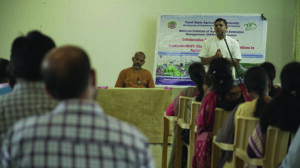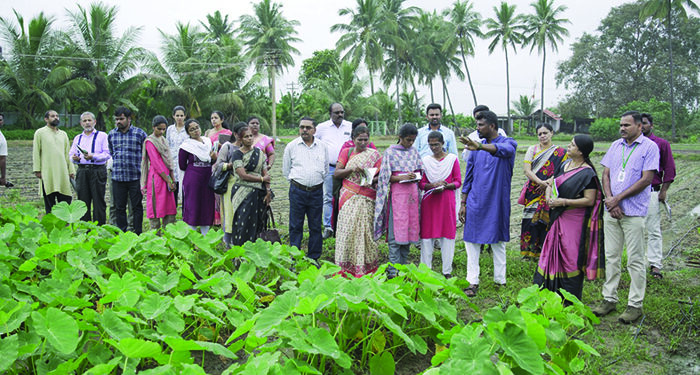COIMBATORE, DEC 17
Isha’s Save Soil and Cauvery Calling movements conducted a workshop on Wednesday as part of the Tamil Nadu Agricultural University (TNAU), Coimbatore training program for officials of agricultural and related departments of various states of India. Senior and intermediate-level officials were briefed about the various aspects of the Save Soil movement and Cauvery Calling movement by the directors of the movement at the Isha Natural Farm in Semmedu, Coimbatore.

The workshop was conducted as part of the five-day training program, “Extension Next – Changing roles and innovations in agricultural extension” from Dec 12 to Dec 16. It was attended by more than 30 officials from various Indian states and saw the presence of Save Soil Project Coordinator Swami Srimukha and Professor Anandraja, Head of TNAU’s Agricultural Expansion Studies initiative.
- Conducted as part of the Tamil Nadu Agricultural University training program, the session lays bare the extension system of Isha’s Save Soil movement and Cauvery Calling movement.
- The workshop was conducted as part of the five-day training program, “Extension Next – Changing roles and innovations in agricultural extension” from Dec 12 to Dec 16
Save Soil Movement, launched by Sadhguru, brings the world’s attention to save the dying soil. The movement is urging nations to mandate 3-6% organic content in agricultural soils around the world through policy-driven initiatives. Cauvery Calling Movement aims to enable 5.2 million farmers to plant 2.42 billion trees in the Cauvery River Basin in 12 years and act as a demonstrable model to Save Soil.
The director of Cauvery Calling, Anand Ethirajulu spoke about the activities undertaken by the movement, challenges, the changes brought about by the movement and future plans.
Explaining the learning curve, Ethirajulu said that initially the movement planted trees in schools and residential areas but their survival rate was less than 40%. However, they found that the trees planted on agricultural lands, besides financially strengthening farmers, grew with an astonishing survival rate of 80%. “In 2009 we started giving high-value timber trees such as Teak, Red sanders, Mahogany, and Malabar Neem at a subsidized rate of Rs 3. The farmers were eager to adopt the method when we explained the short-term and long-term financial insurance these timber trees would bring.”
“For the last 15 years, we have been conducting various training programs where farmers who have successfully undertaken tree-based agriculture share their experience and guidance to farmers embarking on this model. We found this method very effective in building the farmer’s confidence to adopt tree-based agriculture. Currently, we are training 14,000 farmers every year to do tree-based agriculture. 2,500 of those farmers have completely switched to tree-based natural farming,” updated Etirajulu while detailing the current activities of the movement.
Venkatrasa, the Director of Farmer Producer Organizations (FPO) that are functioning under the guidance of Isha, shared, “The central government has announced a plan to start 10,000 FPOs and has accepted Velliangiri Uzhavan FPO as a model FPO. At the recent stakeholders’ conference held in Delhi, Isha Outreach’s model plan for FPOs was submitted to the Ministry of Agriculture which has decided to recommend it all over the country.”
“When we began, it was a difficult task for us to take this concept of FPOs to farmers as agriculture is a very individualized field. With Sadhguru’s guidance, we started Velliangiri Uzhavan. From thinking only about themselves to thinking about solutions for all, there has been a dramatic shift in the farmer’s thinking. We are going to start 25 more FPOs in collaboration with the Ministry of Agriculture,” added Venkatrasa.












